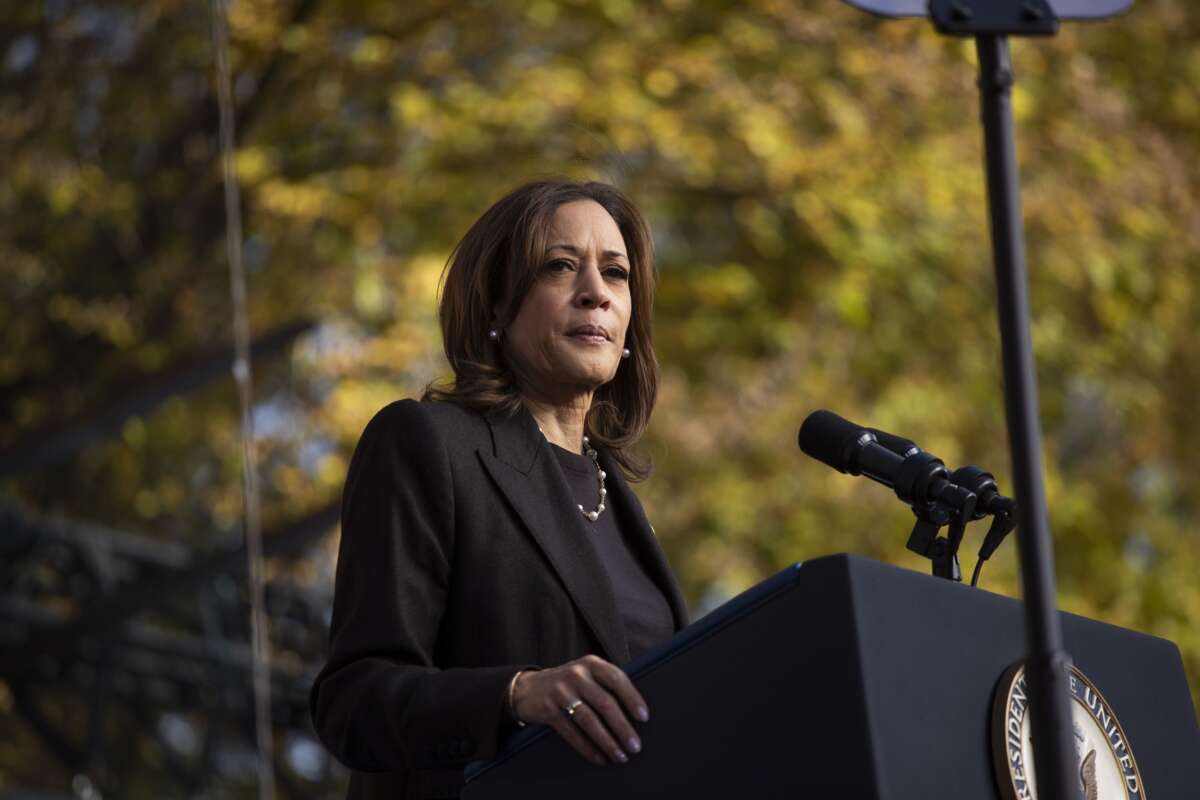Honest, paywall-free news is rare. Please support our boldly independent journalism with a donation of any size.
Vice President Kamala Harris, the Democratic nominee for president, will make an unusual campaign visit to Texas this week, a state viewed as a reliably Republican stronghold.
Presidential candidates usually focus on “swing states” during the general election campaign — states that are near-evenly divided and could tip the Electoral College for either of the two major candidates. However, a new trend has emerged in this year’s race, with both Harris and the Republican nominee for president Donald Trump planning stops that are not in swing states to highlight issues important to the national electorate. (Trump, for example, held a campaign event in Chicago, Illinois, to discuss his economic agenda.)
By making these campaign stops, the candidates may not be directly courting voters in these states, but trying to appeal to swing state voters elsewhere. Traveling to these states could also lay the groundwork for political parties’ campaigns there in the future.
Texas has not voted for a Democratic nominee for president since the 1976 election. However, in recent years, a larger portion of the state has supported the Democratic contenders — in 2000, for example, only 38 percent backed Democratic candidate Al Gore, while in 2008, 43.7 percent voted for Barack Obama, and in 2020, 46.5 percent supported Joe Biden.
Harris’s planned event in Houston on Friday, with less than three weeks to go until Election Day, will focus on abortion rights. Texas is one of the most restrictive states in the country when it comes to abortion, enforcing a ban on the procedure after six weeks of pregnancy, with exceptions allowed only in some cases of rape, incest or when a person’s life is at risk.
In practice, these exceptions are rarely enforced, as the law is written in such a vague way that doctors are unsure when they can determine that an abortion is legally necessary. Dozens of people throughout the country have condemned abortion bans like the one in Texas for putting the lives and health of pregnant people at risk.
The Harris rally will feature some of the people who have suffered due to Texas’s restrictions on reproductive health care.
The issue of abortion has become a pivotal topic in this year’s presidential race, with one in five “early voters” citing it (combined with “women’s rights” in general) as their most important issue, according to one recent poll. Trump’s appointment of three justices to the Supreme Court played a major role in the overturn of Roe v. Wade, the Supreme Court precedent that formerly protected access to abortion throughout the entire country. Harris has promised, if she’s elected president, to sign into law any bill that reaches her desk that would codify the protections that had existed in Roe.
The decision to go to Texas was made to highlight how abortion bans affect everyone, the Harris campaign said.
“We really wanted to go to a place that would properly capture the damage that’s been done to date and how it’s affecting people throughout the state, and to use that as an important tool to tell the story about what’s at stake as it relates to this election with abortion and women’s health care,” David Plouffe, a senior adviser to Harris, said in a statement.
The campaign’s decision to hold a rally in Texas on abortion rights coincides with the release of a report that was published this week showcasing that infant mortality rates have increased in the U.S. following the Supreme Court’s overturn of federal abortion protections.
The study, published on Monday in JAMA Pediatrics, found that hundreds more infants died since Roe was overturned, usually of congenital anomalies, observing an average of around 247 more infant deaths in the months of October 2022, March 2023 and April 2023.
“This is the tip of the iceberg,” said Parvati Singh, co-author of the study and an assistant professor of epidemiology at Ohio State University. “Mortality is the ultimate outcome of any health condition. This is a very, very acute indicator. It could be representative of underlying morbidity and underlying hardship.”
The findings are “evidence of a national ripple effect, regardless of state-level status,” Singh added.
Speaking against the authoritarian crackdown
In the midst of a nationwide attack on civil liberties, Truthout urgently needs your help.
Journalism is a critical tool in the fight against Trump and his extremist agenda. The right wing knows this — that’s why they’ve taken over many legacy media publications.
But we won’t let truth be replaced by propaganda. As the Trump administration works to silence dissent, please support nonprofit independent journalism. Truthout is almost entirely funded by individual giving, so a one-time or monthly donation goes a long way. Click below to sustain our work.
